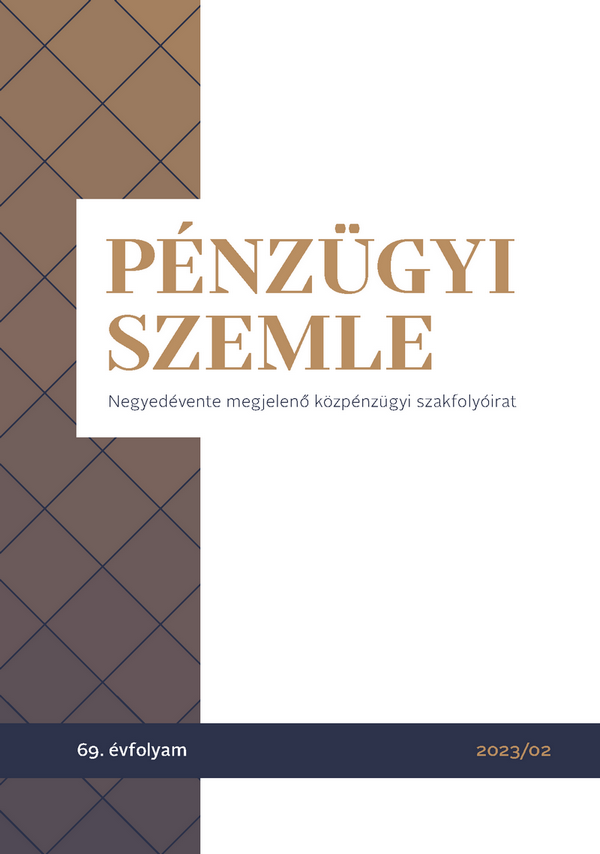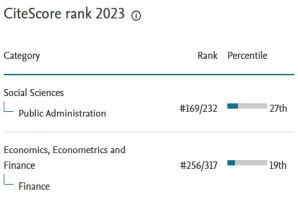A tökéletes minőség modellje és a közpénzügyek minősége
DOI:
https://doi.org/10.35551/PFQ_2023_2_3Kulcsszavak:
tökéletes minőség, stakeholder, közpénzügyi rendszer, számvevőszék, C50, D82, D86, G21Absztrakt
A tanulmány a tökéletes minőség modellezésére vállalkozik annak érdekében, hogy világosabbá váljon a minőségfejlesztés alaplogikája. A modell a stakeholder nézőpont, illetve a Total Quality Managament filozófiája alapján határozza meg a követelményrendszert, melynek a tökéletes minőségű termék lehet képes maradéktalanul megfelelni. A fő akadálya az lehet, hogy a stakeholderi követelményrendszer szinte mindig belső ellentmondásokkal terhes. A már összhangba hozott követelményrendszer elkerülhetővé teszi a minőségfejlesztés tradicionális módját, nevezetesen a követelmények fontossági rangsorolását, és ilyen módon számos figyelmen kívül hagyását. Az összhang megteremtése elsősorban a felek oktatása, tájékoztatása, illetve lobbizás által történhet. A hazai közpénzügyi szervezetek egy része jogorvoslati eljárásokban ismerheti meg közvetlenül a nem hatalomgyakorló érintettek részleges követelményrendszerét, de sokak számára ez sem lehetséges. A hatalomgyakorló szervezetek felé is kevés közpénzügyi szervezetnek van formális hatásgyakorló csatornája, így az Állami Számvevőszéknek és a Magyar Nemzeti Banknak, akik az oktatás és tájékoztatás terén is messze a többi szervezet előtt járnak.
Hivatkozások
Abaidoo, K. Blankenberger, B. (2022) Lean and Public Organization Performance: The Wisconsin Lean Government Initiative at the Wisconsin Department of Health Services, Public Performance & Management Review, 45:3, 706-736, DOI: 10.1080/15309576.2022.2040038
Afonso, António; Ebert, Werner; Schuknecht, Ludger; Thöne, Michael (2005) : Quality of public finances and growth, ECB Working Paper, No. 438, European Central Bank (ECB), Frankfurt a. M. http://hdl.handle.net/10419/152872
Allen, F. et al. (2008): Stakeholder Capitalism, Corporate Governance and Firm Value; (EUI Working Papers ECO) 2009/10, Firenze, European University Institute, Department of Economics, 39. p.
Berzelay, M. (2001) The New Public Management Improving Research and Policy Dialogue; University of California Press, Berkeley
Carlitz, R. Lust, E. (2021) Governance Beyond the State: Social Institutions and Service Delivery; In: Bagenholm, A. Bauhr, M. Grimes, M. Rothsteint, B. (eds.) The Oxford Handbook Of The Quality Of Government, Oxford University Press, Oxford, UK. pp. 620-640.
Charantimath, P. M. (2017): Total Quality Management; Pearson, London
Chen, Y. H. Su, C. T (2006): A Kano-CKM model for customer knowledge discovery; Total Quality Management & Business Excellence, 17 (5), pp. 589-608. https://doi.org/10.1080/14783360600588158
Cole, B. (2011) Lean-Six Sigma for the Public Sector Leveraging Continuous Process Improvement to Build Better Governments; ASQ Quality Press Milwaukee, Wisconsin
Curry, D. J. (1985): Measuring price and quality competition; Journal of Marketing, 49. (2) 106-117. p. https://doi.org/10.1177%2F002224298504900209 Letöltés ideje: 2020. november 16.
Deming, W. E. (1986): Out of the crisis; Cambridge MA, Massachusetts Institute of
Technology, Centre for Advanced Engineering Study,
Domokos László (2019) Miként támogatja az Állami Számvevőszék a jó kormányzást
a közpénzügyek területén? Polgári Szemle, 15. évf. 1–3. szám, 2019, 46–64.,
DOI: 10.24307/psz.2019.0904
Donaldson, T. Preston, L. (1995): The Stakeholder Theory of the Corporation: Concepts, Evidence, and implications; Academy of Management Review, 20. (1) 65-91. p. https://doi.org/10.5465/amr.1995.9503271992
Dooren, W. Thijs, N. Bouckaert, G. (2018) Quality Management and Management of Quality in European Public Administration; In: Löffler E. Vintar M. (eds.) Improving the Quality of East and West European Public Services; Routledge, London, pp. 91-106.
Edvardsson, B. Enquist, B. (2009): Values-based Service for Sustainable Business Lessons from IKEA; London –New York, Routledge
Feigenbaum, A. V. (1983): Total Quality Control; McGraw – Hill, New York
Foster, S. T. (2013): Managing Quality – Integrating the supply chain; Pearson, New York
Freeman, R. E. (1984): Strategic Management – A Stakeholder Approach; London, Pitman Books
Kirby, N. Wolff, J. (2021) “Quality of Government”: A Philosophical Assessment; In: Bagenholm, A. Bauhr, M. Grimes, M. Rothsteint, B. (eds.) The Oxford Handbook Of The Quality Of Government, Oxford University Press, Oxford, UK. pp. 42-62.
Kozák, Anita (2019) Vezetés és szervezés; Líceum Kiadó, Eszterházy Károly Egyetem, Eger
Löffler, E. (2002) Defining and measuring quality in public administration. In J. Caddy & M. Vintar (Eds.), Building better quality administration for the public: Case studies from Central and Eastern Europe (pp. 15–34). Bratislava, H.
Mallory, R. E. (2018) Quality Standards for Highly Effective Government; Routledge, New York
Mitchell, R. K. et al. (1997): Toward a Theory of Stakeholder Identification and Salience: Defining the Principle of Who and What Really Counts; The Academy of Management Review, 22. 853-886. p. https://doi.org/10.5465/amr.1997.9711022105
Mungiu-Pippidi, A. (2021) The Universalization of Ethical Universalism; In: Bagenholm, A. Bauhr, M. Grimes, M. Rothsteint, B. (eds.) The Oxford Handbook Of The Quality Of Government, Oxford University Press, Oxford, UK. pp. 25-41.
Nabatchi, T. O’Reary, R. (2005) The New Governance: Practices and Processes for Stakeholder and Citizen Participation in the Work of Government; Public Administration Review, 65(5), pp. 547-558, https://doi.org/10.1111/j.1540-6210.2005.00482.x
Noordhulzen, J. et al. (2008): Applying HACCP-based Quality Risk Management on dairy farms; Wageningen, Wageningen Academic Publishers, 311. p.
Olander, P. (2021) Economic Diversification, Homogeneity of Interests, and the Impartiality of Government; In: Bagenholm, A. Bauhr, M. Grimes, M. Rothsteint, B. (eds.) The Oxford Handbook Of The Quality Of Government, Oxford University Press, Oxford, UK. pp. 378-398.
Paanakker, H. Masters, A. Huberts, L. (2020) Quality of Governance – Values and Violations; In: Paanakker, H. Masters, A. Huberts, L. (eds.) Quality of Governance – Values and Violations; Palgrave – Macmillan, Cham, Switzerland
Parasuraman, A. Zeithaml, V. A. Berry, L. L. (1988): SERVQUAL: A Multiple-Item Scale for Measuring Consumer Perceptions of Service Quality; Journal of Retailing, 64 (Spring), pp. 12-40.
PEFA (2011) Public Financial Management Performance Measurement Framework, Revised Januáry 2011; Public Expenditure and Financial Accountability Secretariat, Washington DC USA https://europa.eu/capacity4dev/macro-eco_pub-fin/BS-PEFA
Pulay Gyula, Simon József (2020) A közpénzügyi gazdálkodás makrogazdasági teljesítményének mérése; Pénzügyi Szemle, Különszám, pp. 23-43. https://doi.org/10.35551/PSZ_2020_k_1_2
Rosenbloom, D. H. Kvarcuk, R. S. Clerkin, R.M (2015) Public Administration: Understanding Management, Politics, and Law in the Public Sector; McGraw-Hill, New York
Rosta Miklós (2013) Az új közszolgálati menedzsment és a Magyary Zoltán Közigazgatásfejlesztési Program viszonyáról; Polgári Szemle 8(3-6), pp. 32-65.
Rothstein, B. (2011) The Quality of Goverment – Corruption, Social Trust, and Inequality in International Perspective; The University of Chicago Press, Chicago
Rothstein, B. (2021) Quality of Government: Theory and Conceptualization; In: Bagenholm, A. Bauhr, M. Grimes, M. Rothsteint, B. (eds.) The Oxford Handbook Of The Quality Of Government, Oxford University Press, Oxford, UK. pp. 3-24.
Smith, G. F. (1993): The meaning of quality; Total Quality Management, 4. (3) 235-244. p. https://doi.org/10.1080/09544129300000038
Stephenson, P. (2015) Reconciling Audit and Evaluation? The Shift to Performance and Effectiveness at the European Court of Auditors; European Journal of Risk Regulation, Volume 6 , Issue 1 , March 2015 , pp. 79 – 89 DOI: https://doi.org/10.1017/S1867299X0000430X
Taguchi, G. (1993): Taguchi on Robust Technology Development - Bringing Quality Engineering Upstream; ASME Press, New York
Weare, C. (2020) Applying Performance Management Tools to Understand and Improve Rapid Re-Housing Program Outcomes; Cityscape, Vol. 22, No. 3, The Moving to Work Retrospective Evaluation (2020), pp. 269-296. https://www.jstor.org/stable/26967202
Wedel, J. R. (2021) Shadow Elites: Beyond Institutional Corruption Theory and Ill-Conceived Anticorruption Regimes and Toward A New Research Agenda; In: Bagenholm, A. Bauhr, M. Grimes, M. Rothsteint, B. (eds.) The Oxford Handbook Of The Quality Of Government, Oxford University Press, Oxford, UK. pp. 63-92.
##submission.downloads##
Megjelent
Hogyan kell idézni
Folyóirat szám
Rovat
License
Authors assign copyright to Pénzügyi Szemle / Public Finance Quarterly. Authors are responsible for permission to reproduce copyright material from other sources.












